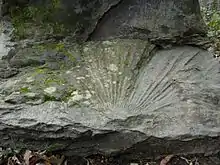Chuckanut Mountains
The Chuckanut Mountains (from "Chuckanut", a native word for "Long beach far from a narrow entrance"[1]), or Chuckanuts, are located on the northern Washington state coast of the Salish Sea, just south of Bellingham, Washington. Being a part of the Cascade Range, they are the only place where the Cascades come west down to meet the sea. The Chuckanuts are considered to be a part of the Puget Lowland Forest Ecoregion.


The range contains Larrabee State Park, the first State Park to be designated in Washington (1923). Its mountains include:
- Anderson Mountain
- Blanchard Mountain
- Chuckanut Mountain (including North Chuckanut Mountain, South Chuckanut Mountain, and Chuckanut Ridge)
- Galbraith Mountain (also known as North Lookout Mountain)
- King Mountain
- Lookout Mountain
- Sehome Hill
- Squalicum Mountain
- Stewart Mountain
- Toad Mountain
Geology
The Chuckanut Mountains were formed by the folding of the Chuckanut Formation (which is predominantly made up of layers of 55-million-year-old sandstone, conglomerate, shale, and bituminous and sub-bituminous coal) and the later Huntingdon Formation (predominantly shale and sandstone) on top, as well as an exposed section of pre-Jurassic-age phyllite.[2] The Chuckanuts are well known for their Tertiary Period leaf fossils.[3]
In 1988, an outcrop of metamorphic phyllite, green chert, and milk quartz on Blanchard Mountain was exposed by a construction crew. The outcrop is unique for its unusually large chunks of stilpnomelane.[4]
References
- "Washington Place Names - Search". Archived from the original on 2012-07-13. Retrieved 2007-10-02.
- "BP Cherry Point Cogeneration Project, Application for Site Certification" (PDF). Energy Facility Site Evaluation Council. Archived from the original (PDF) on 2006-09-25. Retrieved 2007-10-02.
- Sykes, Karen (21 March 2001). "Let mind and feet wander at lovely Squires Lake Park". Seattle Post-Intelligencer.
- George E. Mustoe (December 1998). "Stilpnomelane at Blanchard mountain, western Skagit County, Washington". Washington Geology. 26 (4): 3–8.
External links